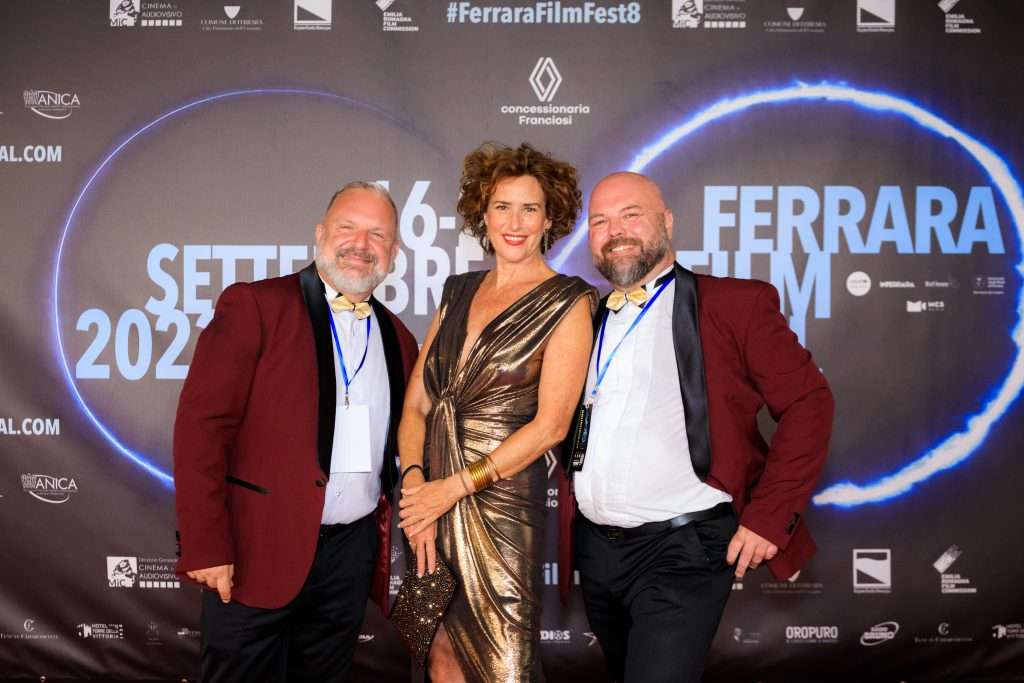
The authors of “La Signora Matilde” and “Il Conte Magico”, both selected in recent years for the Indiecinema Film Festival, tell us about their passion for history
With Il Conte Magico they also won the Audience Award at the first, “historic” (to stay on topic) edition of the Indiecinema Film Festival. While in the second edition they participated, again in the Documentary Competition, with La Signora Matilde, an effervescent portrait of the great Matilde of Canossa. And we know that they are now busy promoting the latest film, in which another leading figure appears: Lucrezia Borgia!
They are Diego Schiavo and Marco Melluso. And while we were preparing to screen again La Signora Matilde in Rome, they wanted to give us the gift of this conversation, so beautiful, but above all useful to help us better understand the coordinates of their cinema.

In Love with History
Diego, Marco, in last years at Indiecinema Film Festival we have had two works created by you, in competition: proceeding a bit “at a crawl”, Il Conte Magico in the first edition and La Signora Matilde. Gossip dal Medioevo in the second.
I would start from the beginning, so… when, but above all how did you start collaborating together on these projects? For example, was the passion for History present in both of you from the beginning?
The passion for History and telling stories has united us since our first meeting! We both have a strong passion for History, which for Marco is also part of his academic career, still teaching History of Roman Law at the Alma Mater in Bologna, and for stories, understood as the creation and development of a story but also as reflection on the story itself and its rewriting. Before approaching the cinematographic language, we had already tackled a revisitation of the myth of Edipo Tiranno in a theatrical project, which was brought to the stage by Lella Costa (for those who were curious and wanted to see it: https://www.youtube.com /watch?v=yfDDUyD_ynk&t=87s). In addition to History, we are also bound by a very deep passion for pop and for the contamination between styles and genres, something that we have recast in our cinematographic works, giving life to docupops, as we have now renamed them, which although remaining in the genre documentary, constitute an experiment and a bet with the public.
Of the two films mentioned, Il Conte Magico also won our Audience Award. We assume that in other contexts the spectators’ reaction was also very warm. Do you think that this lively, creative, somewhat “situationist” way of telling history creates a bridge more easily with the public, at least the most curious one? And do you think that, especially in Il Conte Magico (but upon closer inspection, your other films are no different in this regard) certain presences in the cast also contributed to generating sympathy and an empathetic relationship with the spectators?
Let’s start from afar: emotions have the enormous power to create memory and nourish it. We remember the exciting moments of our life, both sad and joyful, more easily than a normal day at work, like so many others. How we more easily remember a story, read in a book or seen in a film, if we can identify with the characters and events narrated. We are sure that it is easier to identify, and therefore get emotional, with Tasso’s Orlando who loses his mind for love (who hasn’t suffered for love?) than in a chapter of History, in which names of leaders and battle sites. Therefore in telling the story we try to transform that set of dates, names and facts into something exciting and fun, like the most exciting episode of a TV series or an adventure book, which we like to read and reread. Renouncing historical reconstructions but not the precision of the facts, we narrate them in a contemporary context and with a pop language, which collects and refers to a culture that many of us share. In this way the public, in addition to having fun – which is the final and most important goal, in our opinion – recognizes a part of themselves in the story and welcomes it more naturally.
Even the work on the cast starts from this assumption: we always look for familiar faces who however do not convey a sense of distance and extraneousness and with whom people can identify. Syusy Blady, for example, in the collective imagination is the traveler who talks about places and traditions as a friend who has lived an unforgettable experience would tell them.
In films we also have a lot of fun scattering cameos – Il Conte Magico is full of them – to convey the impression that we are telling each other about it among friends, as if it were a nice day spent together. The Cameos – like references to pop culture – also serve us to explode and broaden the meaning of the narrative, almost adding a further dimension to the whole, that of the short circuit of the quote.

From Matilde di Canossa to Syusy Blady
Coming to La Signora Matilde, the film that participated in the second edition of the Indiecinema Film Festival, how was the relationship with your heroine on stage, the legendary Syusy Blady, born and how did it develop?
It was really very nice and pleasant to work with Syusy Blady because together we looked for a simple and friendly tone of voice. His experience in the relationship with the public has pushed us to constantly investigate the dimension of clarity without ever giving in to the trivialization of contents.
In this film more than in others, the accuracy of historical research is paired with a surprising reworking of it in a modern key, where the language of social media is jokingly referenced. How did you find yourself working on this perspective?
It is usually thought that creativity and imagination only work if left free. On the contrary, true creativity is unleashed when it must be used to solve problems. How do I say this? How do I render this image? When we won the tender from the Emilia-Romagna Film Commission to tell the story of Matilde of Canossa, the problem to face was truly enormous: how do we tell one of the most tangled (and boring) historical moments of all time, such as the fight for the investitures, without negative reactions from the public, something like “che agli spettatori gli scenda la catena” as we are used to say in Bologna? We have read and seen a lot about Matilde of Canossa, including articles, books and documentaries and we have noticed a common characteristic: if you are not in the sector, you struggle to be interested in a story told in a serious but too often serious way. We wanted to speak to a wider audience and not just specialists and enthusiasts. The solution to the problem came to us with a further question: who would Matilde of Canossa be if she were born in the present day? At that point we started to like the game, lots of light bulbs went on and the pop language spontaneously intruded into our creative process. It was almost natural to come to the conclusion that Matilde today could only be an influencer, a brand content creator (to put it in technical terms from the world of social media). In short, someone who would have given the wildest Chiara Ferragni a run for her money! And then, by studying and deepening the characters we narrate, and this also applies to the other two films, Il Conte Magico and L’incantevole Lucrezia Borgia, we realized that the ancient sources themselves are full of surprises, they often tell very funny facts . The truth is that we don’t add anything that isn’t already in the story itself.

Waiting for Lucrezia…
Regarding the most classic documentary, its recent hybridizations or even fiction cinema, which are the authors, works and genres that fascinate you the most?
We have very diverse tastes within our writing group. In literature, we move from contemporary literature (like Andrea Meli), to fantasy (like Marco) and essays (like Diego). In cinema we range between the great Hollywood classics, which we often cite, such as The Wizard of Oz, but also the sophisticated comedies of the 50s and 60s, for which we have a real passion. Wilder was a genius for us, to name one.
In the meantime, however, you have shot another film: briefly, do you want to talk to us about it?
The title already says it all: L’incantevole Lucrezia Borgia. Not the murderer, the poisoner, the incestuous one. Because this has been unfairly said about her for five hundred years, and in this way it has been told in novels, operas, and, still today, in TV series and video games.
We, however, chose to tell it correctly. And, retracing the events without prejudice, we realized that in her life there are all the elements of a soap opera, or rather, the greatest soap opera of the Renaissance: arranged marriages, murdered husbands, secret children, envious sisters-in-law, plot twists and so on and so forth. At the center is her, a girl with contagious joy, extremely intelligent and refined, enchanting indeed, with a strong sense of duty and great dignity. Since she was little, poor Lucrezia has been a pawn in the power games of her father, Pope Alexander VI, and her brother Cesare, an unscrupulous and power-hungry man. Plus, she had to put up with all the nastiness and gossip that persecuted her. But, like all soap opera heroines, she never lost heart and over time she managed to take control of her life and demonstrate her value and talent.
The narrator of the story is Lucrezia Lante della Rovere, and it is no coincidence: she is called Lucrezia in honor of the Borgia, but she is also a descendant of Pope Julius II, born Giuliano della Rovere, the bitter enemy of the Borgias. So he made peace between the families, giving Lucrezia Borgia the right historical dimension. And since we tell this story like a soap opera, together with Lucrezia Lante there is Tullio Solenghi. Who doesn’t remember his parodies together with the trio of South American telenovelas, such as The Kidnapping of Dolores, and the catchphrase “Drink something Pedro”? In short, no one could give voice to the greatest soap opera of the Renaissance better than Tullio Solenghi. And then in the cast there are also Francesco Zecca and Tobia De Angelis, the inevitable Ruggeri twins, Denis Berri, Mirella Mastronardi and Simona Selvini.
And Lucrezia Borgia, after Matilde di Canossa and Cesare Mattei, we are sure will continue to surprise and be talked about.
Stefano Coccia




